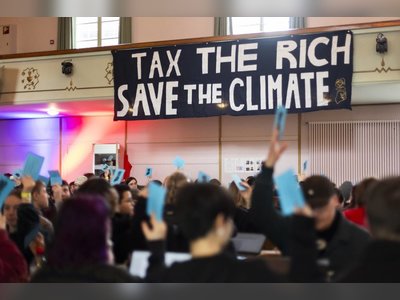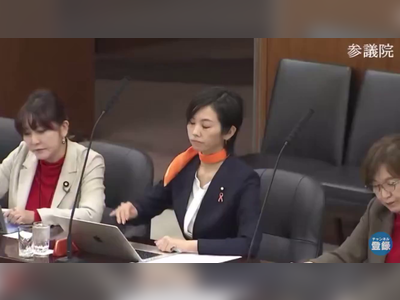Manila Times
Upholding Truth. Empowering the Philippines
Sunday, Dec 07, 2025
The Nation's Story is Told with Honor
Trump, in a major concession, says the tariff on China should be 80% — but will leave it up to Bessent
President suggests lowering tariffs from 145% to 80% as negotiations with China commence, amid plummeting trade volumes.
President Donald Trump has set the stage for discussions with China by proposing a reduction of the current 145% tariff on Chinese goods to 80%.
This announcement was made via a series of posts on Truth Social ahead of the anticipated trade talks scheduled to take place in Geneva this weekend involving US Treasury Secretary Scott Bessent, US Trade Representative Jamieson Greer, and their Chinese counterparts.
In his posts, Trump emphasized that China should increase its imports of US goods, suggesting that an opening of Chinese markets would be beneficial both for the US and for China.
He asserted that lowering the tariff to 80% was a reasonable concession, leaving the final decision to Secretary Bessent.
This proposed reduction would represent a major shift from the current trade environment, which has resulted in a 60% decrease in shipments from China to the United States.
The trade tensions have started to impact prices, with analysts projecting that inflation could rise to approximately 4% by the end of the year due to the ongoing trade war.
Even if tariffs were lifted entirely, price increases and shortages could persist in the short term given the current decline in imports.
In related developments, China's exports to the United States fell by 21% in the previous month, demonstrating the immediate effect of tariffs prior to their full implementation.
Trump characterized this decline as advantageous, suggesting that it reflects the US no longer incurring financial losses, although this interpretation has been debated among economists.
Both Trump and Bessent have remarked that the high tariff rates imposed by the US and China are unsustainable and must be re-evaluated.
However, senior administration officials have tempered expectations regarding the outcomes of the upcoming Geneva talks.
They have cautioned that the discussions should be viewed as an initial step toward more constructive dialogue rather than an immediate path to a formal trade agreement.
Kevin Hassett, Director of the National Economic Council, noted that changes to tariffs are not anticipated before the negotiations conclude.
Bessent indicated earlier in the week that the primary aim of the discussions would be to de-escalate the current trade conflict, suggesting that the tariffs in place are akin to an embargo.
Meanwhile, the trade war has contributed to an economic downturn in the United States, with recent GDP reports indicating the country experienced its first contraction since early 2022.
The data reflects businesses stockpiling goods to mitigate the anticipated effects of tariffs.
Despite the imminent talks in Geneva, Bessent expressed that the normalization of trade relations could span two to three years, highlighting the complexity of the current negotiation landscape.
This announcement was made via a series of posts on Truth Social ahead of the anticipated trade talks scheduled to take place in Geneva this weekend involving US Treasury Secretary Scott Bessent, US Trade Representative Jamieson Greer, and their Chinese counterparts.
In his posts, Trump emphasized that China should increase its imports of US goods, suggesting that an opening of Chinese markets would be beneficial both for the US and for China.
He asserted that lowering the tariff to 80% was a reasonable concession, leaving the final decision to Secretary Bessent.
This proposed reduction would represent a major shift from the current trade environment, which has resulted in a 60% decrease in shipments from China to the United States.
The trade tensions have started to impact prices, with analysts projecting that inflation could rise to approximately 4% by the end of the year due to the ongoing trade war.
Even if tariffs were lifted entirely, price increases and shortages could persist in the short term given the current decline in imports.
In related developments, China's exports to the United States fell by 21% in the previous month, demonstrating the immediate effect of tariffs prior to their full implementation.
Trump characterized this decline as advantageous, suggesting that it reflects the US no longer incurring financial losses, although this interpretation has been debated among economists.
Both Trump and Bessent have remarked that the high tariff rates imposed by the US and China are unsustainable and must be re-evaluated.
However, senior administration officials have tempered expectations regarding the outcomes of the upcoming Geneva talks.
They have cautioned that the discussions should be viewed as an initial step toward more constructive dialogue rather than an immediate path to a formal trade agreement.
Kevin Hassett, Director of the National Economic Council, noted that changes to tariffs are not anticipated before the negotiations conclude.
Bessent indicated earlier in the week that the primary aim of the discussions would be to de-escalate the current trade conflict, suggesting that the tariffs in place are akin to an embargo.
Meanwhile, the trade war has contributed to an economic downturn in the United States, with recent GDP reports indicating the country experienced its first contraction since early 2022.
The data reflects businesses stockpiling goods to mitigate the anticipated effects of tariffs.
Despite the imminent talks in Geneva, Bessent expressed that the normalization of trade relations could span two to three years, highlighting the complexity of the current negotiation landscape.
AI Disclaimer: An advanced artificial intelligence (AI) system generated the content of this page on its own. This innovative technology conducts extensive research from a variety of reliable sources, performs rigorous fact-checking and verification, cleans up and balances biased or manipulated content, and presents a minimal factual summary that is just enough yet essential for you to function as an informed and educated citizen. Please keep in mind, however, that this system is an evolving technology, and as a result, the article may contain accidental inaccuracies or errors. We urge you to help us improve our site by reporting any inaccuracies you find using the "Contact Us" link at the bottom of this page. Your helpful feedback helps us improve our system and deliver more precise content. When you find an article of interest here, please look for the full and extensive coverage of this topic in traditional news sources, as they are written by professional journalists that we try to support, not replace. We appreciate your understanding and assistance.









